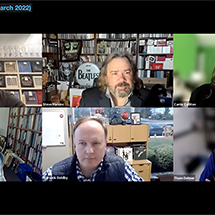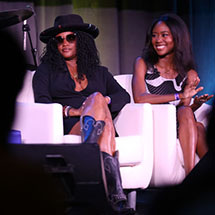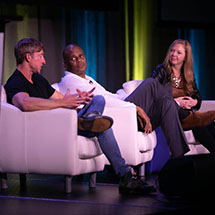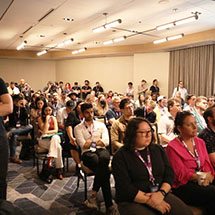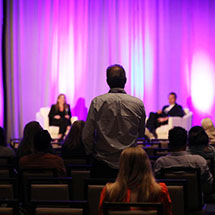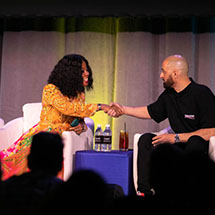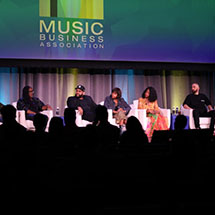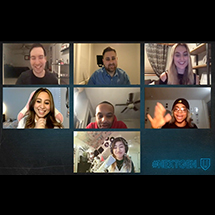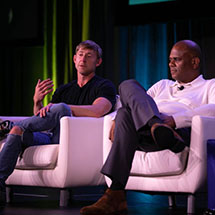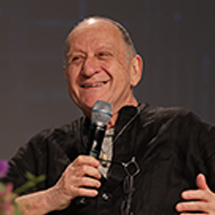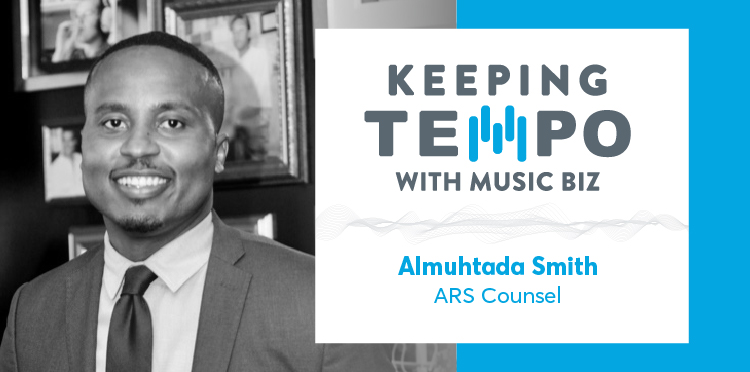
[Keeping Tempo With Music Biz] — Tackling the Challenges Presented by Generative AI in Music: An Interview with ARS Counsel’s Almuhtada Smith

As with the advent of most new technologies, the arrival of Generative AI tools poses unprecedented opportunities and challenges for the music industry ecosystem. While some artists are already using these tools as an additive element to their creative process, bad actors have found ways to exploit them by posting fake tracks modeled after, and attributed to, today’s most popular artists to DSPs for monetary gain. Moreover, there are serious ethical concerns over exploitation of culture and perpetuating stereotypes due to the nature of AI models being based on existing art. In this month’s Keeping Tempo interview, we asked Almuhtada Smith of ARS Counsel to help us grapple with the current state of Generative AI tools and how the legal landscape is shaping up to protect artists and rightsholders, both now and in the near future.
Music Biz: 2023 has very much felt like the proper public debut of Generative AI technology. Can you outline for our readers the potential threats that this tech poses to artists and rightsholders?
Almuhtada Smith: Generative AI possesses the capability to meticulously analyze and replicate content closely aligned with the artistic creations of others. Consequently, the task of safeguarding the intellectual property of artists and rightsholders become notably intricate, exerting influence over both creative integrity and financial stakes for the original creators. This predicament could potentially lead to an inadequate attribution and recognition of artists’ original contributions. Particularly impactful is the predicament faced by artists who have cultivated distinct and recognizable styles integral to their identity and brand. The arrival of Generative AI introduces the prospect of their exploitation, thereby resulting in potential risks of brand dilution and a loss of authority over their established artistic style.
Generative AI is also versatile enough to manipulate images, sounds, and videos, creating deceitful and harmful material which damages the reputation of artists. Additionally, there’s a possibility that the demand for traditional artists could decrease. Consumers might prefer AI-generated content that’s cheaper and resembles the quality and style of professional artists making it harder to maintain the appeal of genuine artistic creation.
A significant concern arises in the context of Black musicians and the broader realm of Black creative expression. History has seen instances where novel ideas and creations from Black artists have been taken without proper credit. This is further worsened by a history of systematic racism in the music industry, like unfair record deals. Now, AI technology adds another layer of complexity. It can replicate the voices of Black musicians so well that anyone could imitate the original artist, perpetuating a cycle of cultural neglect.
Music Biz: We’re still fairly early in the life cycle of this new tech, but are there any proposals for ways to strengthen copyright protections that show promise of effectively addressing blind spots that exist?
AS: Artists are currently confronted with a realm of limited remedies in cases where AI software employs their voices without due permission. The scope of copyright protection primarily extends to the content articulated by the voice, rather than encompassing the sound quality of the voice itself. Consequently, the existing framework of the Federal Copyright law might prove inadequate to safeguard the interests of artists and rightsholders within this context.
Legal actions against generative AI are already underway, which leads to a new phase where the legal system is trying to figure out what counts as a new version of a work under the rules of intellectual property. The results of these lawsuits will probably depend on how the fair use doctrine is interpreted by legal scholars and practitioners.
The intersection of technology and copyright law has historically caused conflicts, exemplified by the precedent-setting case in Authors Guild, Inc. v. Google, Inc. where Google successfully asserted transformative use, leveraging snippets of text from books to bolster its search engine functionality. This landmark case continues to resonate as a pivotal legal reference.
Presently, there is a lot of uncertainty with AI in general. Nevertheless, it is unmistakable that artists are in dire need of a more enduring avenue of redress, as the challenges posed by AI-generated music persistently impacts their realm. With the development of AI and the role it plays in music, it is becoming increasingly pressing to establish a sustainable framework that secures the rights and interests of artists.
Music Biz: What protections from possible copyright infringement due to Generative AI do artists & rightsholders have today under our current legal framework?
AS: As previously indicated, it is important to note that the human voice itself does not fall within the purview of copyrightable material. Within the current construct of copyright law, the existing framework may lack the capacity to provide adequate protection for artists in this particular context.
The most applicable alternative form of recourse is through leveraging personality rights or publicity rights and name image likeness (NIL) rights. These rights include an individual’s name, likeness, signatures, or any identifying characteristics which also includes an artist’s singing voice. However, not all states recognize NIL rights, and the states that do will not legally acknowledge postmortem rights.
Another alternative avenue that artists could explore is grounded in the realm of privacy torts, specifically under the doctrine of misappropriation, which is encompassed within common law and is available across all states. However, it’s essential to emphasize that this recourse necessitates a commercial utilization of the voice, thereby confining the circumstances under which artists can seek this particular form of legal remedy.
In instances where copyright law does not extend sufficient safeguards against the exploitation of artists’ voices, recourse to privacy torts involves an interplay with copyright law, particularly leveraging the Digital Millennium Copyright Act (DMCA) takedown notices. This mechanism empowers artists to request online platforms to remove instances of AI-generated voice utilization. Artists such as Jay Z, Drake and The Weeknd have leveraged DMCA takedowns, initially designed for copyright infringement, to effectively compel the removal of AI-generated music employing their voices from platforms like YouTube, Spotify and Apple Music. While it may not be the most legally airtight approach, it has proven to be effective in addressing this challenge.
Music Biz: Are there any parallels between Generative AI and other technologies who have received similar scrutiny that our industry can look at to guide how we enforce protections against potential exploitation?
AS: Upon their initial introduction, social media platforms encountered meticulous scrutiny owing to concerns revolving around misinformation, hate speech, and how to control the type of content allowed. As a response to the concerns and critique, social media platforms created rules and guidelines to reduce harmful content, so users are protected from being taken advantage of. Similarly, as Generative AI technology becomes more prominent, it will also need rules and guidelines to safeguard users against potential exploitation.
Music Biz: The Recording Academy recently updated its rules to specify that music with “no human authorship” is ineligible from receiving a GRAMMY Award. Does the level of human vs. AI involvement in creating music have, in your mind, any effect on the legality of Generative AI applications?
AS: The level of human vs. AI involvement in creating music does affect the legality of generative AI applications. Legal considerations involve originality, creativity, copyright, and ownership. If the AI’s role is minimal by replicating existing work, it might not be eligible for copyright protection. AI’s autonomous creation raises questions about ownership. AI-generated music based on existing compositions could lead to licensing and permission issues. Fair use and transformative use may apply, and ethical concerns like plagiarism and cultural appropriation could influence legality. As AI evolves, legal systems may adapt, and determining legality requires analyzing factors like AI’s role, artist input, originality, and intended use.
Music Biz: From a legal perspective, are there benefits to using Generative AI tech that are worth creating guidelines around to ensure that artists might safely take advantage of them?
AS: With appropriate guidelines in place, Generative AI holds the potential to significantly advantage artists. The purpose of AI should not be to replace artists, but to work alongside them. Generative AI can push the limits of creativity and show artists new ways to create their art. Moreover, it offers the prospect of automating repetitive tasks within the creative process, thereby affording artists the opportunity to channel their energy and time toward the core pursuit of their artistic expression.
Music Biz: Some artists, most notably Grimes, have come out in support of allowing the use of their voice in AI-generated songs, albeit with compensation structures in place so they are properly paid if the tracks make any money. Do you feel that whether or not an artist’s likeness can be used by an AI algorithm will ultimately be determined by each individual artist’s decision to opt in or out of using this technology?
AS: Grimes is proactively taking steps to anticipate the advancement of AI technology and is publicly asserting her willingness to permit the utilization of her voice, provided she receives equitable compensation. Given the inevitable trajectory of AI development in our contemporary landscape, the option for artists to either engage or abstain becomes imperative. This choice empowers artists to exert greater authority over their vocalizations, musical creations, and creative concepts. This dynamic ensures that artists’ skills and talent are recognized, allowing them to use a new way to share their passion for music.
Music Biz: Our industry has also seen experiments to develop full-on AI-generated artists like FN Meka, which have been met with substantial, justified criticism regarding how the tech can perpetuate stereotypes and exploit human culture for monetary gain. Does the wholesale creation of “new artists” have greater hurdles to clear if it were to ever mature enough for it to be responsibly used?
AS: If the prospect of extensively generating entirely “new artists” reaches a level of maturity where responsible usage is possible, it is evident that substantial challenges would need to be addressed. These challenges revolve around complex ethical, cultural and artistic considerations, encompassing issues like authenticity, creative integrity, potential biases, and cultural sensitivity. The whole creation of “new artists” would necessitate a comprehensive evaluation, robust regulatory frameworks, and a profound understanding of the broader societal and artistic implications. Safeguarding against perpetuating harmful stereotypes and preserving cultural respect would be imperative in responsibly navigating this uncharted territory.
Music Biz: Another potential application of this technology is similar to what UMG and Endel recently partnered on, tech that allows artists to reimagine their own songs to create “functional music” or soundscapes. Are the laws around this use case any more clear-cut since it involves artists who wrote and registered the songs that they are remixing?
AS: The legal landscape is notably more straightforward due to the direct involvement of artists who originally composed and registered the songs being remixed. Since these artists possess the rightful ownership and control over their creative works, the legal framework aligns more clearly with their inherent rights and creative prerogatives. The situation is distinct from instances where third-party materials or copyrighted content are involved, which often introduce more intricate legal considerations.
It’s important for artists to have the option to opt-in and receive appropriate compensation for their creative works. The principle of equitable compensation is integral; UMG receiving payment should be contingent upon ensuring that artists receive their due share.
You can read past Keeping Tempo articles via the portal linked here. And, stay tuned for more insightful discussions from our members and partners from across the industry!


